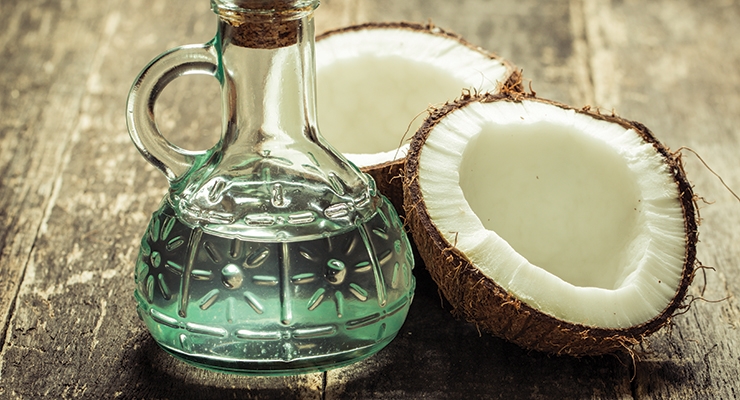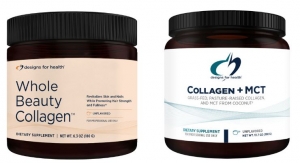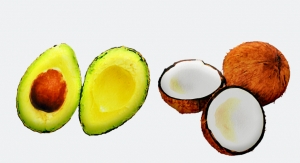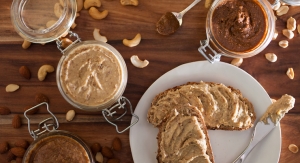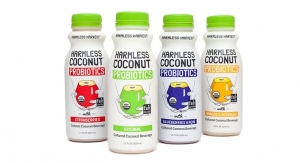Pete Maletto, PTM Food Consulting06.01.16
Eating trends have changed immensely over the past decade. Education about certain types of foods and their benefits has been rising steadily. Social websites, celebrity doctors, smartphone apps and a host of other media outlets are all promoting dietary awareness as the key to longevity and life extension—and not big pharma. Millennials lead this thought process, however, education is far reaching across generations and growing steadily as people experience key health benefits from including important nutrients in their diet.
Leading most of these functionalities in food, reduction of body inflammation is now being considered the “holy grail” of life extension. The public now has a better understanding of how dietary restrictions and inclusions will reduce ailments from joint pain to heart attacks to cancer. Medical experts have been releasing a consistent stream of new findings and published research.
Inflammation is a naturally occurring process that happens when the human body incurs injury or damage. As people age, their internal “systems” become damaged and chronic inflammation becomes an issue for many. Constant, chronic inflammation can lead to a host of diseases, including those of the brain and central nervous system, such as Alzheimer’s, Parkinson’s and Huntington’s.
With chronic inflammation, the body becomes crippled, as prostaglandins COX 2 (cyclooxygenase) and 5 LOX (lipoxygenase) inflammatory enzymatic reactions rise. This can trigger disease processes like the buildup of plaque in the arteries, which leads to heart attacks or genetic mutations that lead to cancer. Chronic inflammation is something people can control through diet and the inclusion of functional foods that reduce the processes that cause these diseases.
Anti-Inflammatory Agents
In today’s society, diets often lack important nutrients, beyond basic vitamins and minerals, that can play a role in improving overall health. At the same time, consumers are often looking to add functional health products into their daily routines. This confluence of factors has created an opportunity for food and beverage companies, which are well positioned to capitalize on these trends.
Increasingly educated consumers are looking to eat well and stay healthy. This growing obsession with longevity has people searching online to raise their “food IQ” about what to add, and also what to eliminate.
Turmeric has been a rising star of functional food ingredients in North America, with growth steadily increasing as consumers look to incorporate this important anti-inflammatory nutrient into their diet. The life extension benefits from turmeric are widespread. Clinical research on the neon yellow pigment (curcuminoids) has demonstrated reduction of various ailments associated with inflammation. Studies have shown curcumin to have anti-tumor and antioxidant activity in addition to potent anti-inflammatory effects. The anti-inflammatory action of curcumin relates to its ability to inhibit the body’s production of pro-inflammatory signaling compounds called COX 2 and prostaglandins/eicosanoids.
Because turmeric is a full-flavored root, consuming it in food form can be a bit tricky, as its spicy nature can be challenging to overcome in a food or beverage. While many consumers take standardized curcuminoids in capsules, other options for incorporating it into the diet include adding it as a topping on salads, blending it into a smoothie or sprinkling on an avocado or vegetables. There are now multiple turmeric beverages on the market that have distribution at regional health food stores and Whole Foods. Surprisingly enough, these beverages have medicinal amounts that can deliver real health benefits.
Along with turmeric, ginger is another spice derived from roots. Ayurveda credits ginger as one of the most functional medicinal foods because, like turmeric, it can treat a wide variety of inflammatory conditions. Active compounds such as zingerone, shogaols and, most importantly, gingerols, give ginger its distinct aroma and flavor as well as its anti-inflammatory properties.
Consumption of ginger may help to decrease muscle soreness, inflammation, relieve osteoarthritis pain and even a common stomachache. Gingerols have been shown to inhibit those same inflammatory enzymes that turmeric lowers, such as COX 2 and 5 LOX. Since ginger appears to inhibit both COX 2 and 5 LOX, it can lead to a lower production of pain-inducing chemical messengers like LTs (leukotrienes), TNF (tumor necrosis factor) and PGs (prostaglandins). This occurs systemically and at the site of inflammation.
Ginger is a much easier addition to foods and beverages, as consumers tend to like the bite associated with its use, and it complements juices such as citrus to create an interesting flavor. Other means of delivery include salad dressings and crystallized ginger, and it also makes a good addition to smoothies.
Plant-Based Diets
As popular as the term anti-inflammatory has become, plant-based diets have become much more mainstream. In order to cut out allergens that promote inflammation, consumers are looking at hypoallergenic diets and lifestyles in order to improve quality of life. Casein (milk), fish, beef and chicken have at times been associated with negative health effects. Utilizing plant-based proteins and eliminating possible allergens, including hormones and antibiotics in animal protein, is very beneficial to the digestive and hormonal system.
Many studies have evaluated the impact of vegan diets on inflammation. In the most recent study, published in Complementary Therapies in Medicine last year, 600 participants followed a vegan diet for three weeks, which significantly reduced C-reactive protein, a key blood marker for inflammation. Plant-based diets can do more than just reduce inflammation though; they also produce a more alkaline blood environment, which is another huge life extension benefit. Clinical research has shown an association between more alkaline blood environments and reduced incidence of serious disease, whereas more acidic environments from diets high in sugar, animal meats and processed foods can actually cause mutations and enhanced disease states.
Healthy Fats
For years, many consumers have been told to avoid high-fat diets. However, experts now realize that not all fats are bad. In fact, consumers are finding that diets high in good fats such as those from fish, nuts, seeds, coconuts or avocados are truly heart healthy and anti-inflammatory additions that should be incorporated into a balanced diet.
Avocado is a prime example. In fact, 77% of the calories in an avocado are derived from fat, making it one of the fattiest plant foods in existence. The majority of the fat in avocado is oleic oil, a heart-healthy monounsaturated fat, which in many studies has been shown to be anti-inflammatory and cardio-protective. Oleic acid has been scientifically proven to reduce inflammation and been shown to have beneficial effects on genes linked to cancer. High oleic oils are also great for cooking and demonstrate great heat stability and prevention of oxidation.
Coconut oil is another healthy, functional ingredient that has seen significant and rising interest. To date, there are more than 1,000 studies demonstrating that fats from coconuts are among the healthiest and best sources of energy. Coconut oil contains healthy fats called medium-chain fatty acids (MCFAs). These unique fats include caprylic, lauric and capric acids; 62% of the oils in coconut are made up of these three healthy fatty acids, while 91% of the fat in coconut oil is healthy saturated fat. Despite a stigma around saturated fat, coconut oil has benefited from a health halo.
At nine calories per gram, fats usually take longer to digest, but the medium chain fatty acids found in coconut oil provide a quick source of energy because they only need to go through a three-step process in the liver to be turned into fuel, while other fats go through a 26 six-step process.
Coconut oil is more than just a great source of energy. As the liver processes coconut oil it creates ketones, which represent an energy source that is readily accessible by the brain. In fact, it is more brain friendly than glucose. The brain needs insulin to process glucose and power brain cells, but with age, insulin sensitivity takes a turn for the worse. The ketones from coconut oil offer an alternate source of energy to help repair brain function.
Market Potential
Here’s an unfortunate revelation: the U.S. ranked 21 out of 125 countries in terms of overall diet quality, according to an Oxfam study titled “Good Enough to Eat.” That study put the U.S. behind The Netherlands, almost all of Western Europe and Australia. But even more disturbingly, the report noted that the U.S. ranks 120 out of 125 in terms of how diet influences health. While awareness about what consumers eat and how it affects their health has improved in many places, there is still much work to be done in order to change old habits.
Today, manufacturers and marketers of foods and beverages are well positioned to deliver functional products to an audience hungry for health and wellness solutions. The avenues for communication are vast, as educating consumers about health ingredients and the associated benefits remains vital to future prospects.
Dr. Robert Atkins, who was a visionary and personal mentor, brought the popularity of the low-carb diet to the forefront in the late 1970s. Carbohydrate awareness was promoted everywhere while Dr. Atkins was alive, and now that understanding has never been higher as marketers promote good carbs and healthy fats. While fat was enemy number one 20 years ago, sugar seems to be the new villain, as more studies implicate excessive sugar as a top contributor to diabetes, inflammation and cancer.
Reducing sugars, and adding functional ingredients like fibers is continuing to gather steam. In the coming years I predict a very different store shelf at the supermarket will develop to include innovative, clean, low-sugar, great tasting foods that deliver functional and nutritional benefits.
With the help of influencers, public officials and the natural products industry, increased knowledge about the evolving role functional foods can play in improving health will become more expansive.
Pete Maletto is president and senior scientist at PTM Food Consulting, Point Pleasant, NJ. He has more than 20 years of experience formulating healthy and functional foods and beverages. For more information: 888-736-6339; info@ptmfood.com; www.ptmfood.com.
Leading most of these functionalities in food, reduction of body inflammation is now being considered the “holy grail” of life extension. The public now has a better understanding of how dietary restrictions and inclusions will reduce ailments from joint pain to heart attacks to cancer. Medical experts have been releasing a consistent stream of new findings and published research.
Inflammation is a naturally occurring process that happens when the human body incurs injury or damage. As people age, their internal “systems” become damaged and chronic inflammation becomes an issue for many. Constant, chronic inflammation can lead to a host of diseases, including those of the brain and central nervous system, such as Alzheimer’s, Parkinson’s and Huntington’s.
With chronic inflammation, the body becomes crippled, as prostaglandins COX 2 (cyclooxygenase) and 5 LOX (lipoxygenase) inflammatory enzymatic reactions rise. This can trigger disease processes like the buildup of plaque in the arteries, which leads to heart attacks or genetic mutations that lead to cancer. Chronic inflammation is something people can control through diet and the inclusion of functional foods that reduce the processes that cause these diseases.
Anti-Inflammatory Agents
In today’s society, diets often lack important nutrients, beyond basic vitamins and minerals, that can play a role in improving overall health. At the same time, consumers are often looking to add functional health products into their daily routines. This confluence of factors has created an opportunity for food and beverage companies, which are well positioned to capitalize on these trends.
Increasingly educated consumers are looking to eat well and stay healthy. This growing obsession with longevity has people searching online to raise their “food IQ” about what to add, and also what to eliminate.
Turmeric has been a rising star of functional food ingredients in North America, with growth steadily increasing as consumers look to incorporate this important anti-inflammatory nutrient into their diet. The life extension benefits from turmeric are widespread. Clinical research on the neon yellow pigment (curcuminoids) has demonstrated reduction of various ailments associated with inflammation. Studies have shown curcumin to have anti-tumor and antioxidant activity in addition to potent anti-inflammatory effects. The anti-inflammatory action of curcumin relates to its ability to inhibit the body’s production of pro-inflammatory signaling compounds called COX 2 and prostaglandins/eicosanoids.
Because turmeric is a full-flavored root, consuming it in food form can be a bit tricky, as its spicy nature can be challenging to overcome in a food or beverage. While many consumers take standardized curcuminoids in capsules, other options for incorporating it into the diet include adding it as a topping on salads, blending it into a smoothie or sprinkling on an avocado or vegetables. There are now multiple turmeric beverages on the market that have distribution at regional health food stores and Whole Foods. Surprisingly enough, these beverages have medicinal amounts that can deliver real health benefits.
Along with turmeric, ginger is another spice derived from roots. Ayurveda credits ginger as one of the most functional medicinal foods because, like turmeric, it can treat a wide variety of inflammatory conditions. Active compounds such as zingerone, shogaols and, most importantly, gingerols, give ginger its distinct aroma and flavor as well as its anti-inflammatory properties.
Consumption of ginger may help to decrease muscle soreness, inflammation, relieve osteoarthritis pain and even a common stomachache. Gingerols have been shown to inhibit those same inflammatory enzymes that turmeric lowers, such as COX 2 and 5 LOX. Since ginger appears to inhibit both COX 2 and 5 LOX, it can lead to a lower production of pain-inducing chemical messengers like LTs (leukotrienes), TNF (tumor necrosis factor) and PGs (prostaglandins). This occurs systemically and at the site of inflammation.
Ginger is a much easier addition to foods and beverages, as consumers tend to like the bite associated with its use, and it complements juices such as citrus to create an interesting flavor. Other means of delivery include salad dressings and crystallized ginger, and it also makes a good addition to smoothies.
Plant-Based Diets
As popular as the term anti-inflammatory has become, plant-based diets have become much more mainstream. In order to cut out allergens that promote inflammation, consumers are looking at hypoallergenic diets and lifestyles in order to improve quality of life. Casein (milk), fish, beef and chicken have at times been associated with negative health effects. Utilizing plant-based proteins and eliminating possible allergens, including hormones and antibiotics in animal protein, is very beneficial to the digestive and hormonal system.
Many studies have evaluated the impact of vegan diets on inflammation. In the most recent study, published in Complementary Therapies in Medicine last year, 600 participants followed a vegan diet for three weeks, which significantly reduced C-reactive protein, a key blood marker for inflammation. Plant-based diets can do more than just reduce inflammation though; they also produce a more alkaline blood environment, which is another huge life extension benefit. Clinical research has shown an association between more alkaline blood environments and reduced incidence of serious disease, whereas more acidic environments from diets high in sugar, animal meats and processed foods can actually cause mutations and enhanced disease states.
Healthy Fats
For years, many consumers have been told to avoid high-fat diets. However, experts now realize that not all fats are bad. In fact, consumers are finding that diets high in good fats such as those from fish, nuts, seeds, coconuts or avocados are truly heart healthy and anti-inflammatory additions that should be incorporated into a balanced diet.
Avocado is a prime example. In fact, 77% of the calories in an avocado are derived from fat, making it one of the fattiest plant foods in existence. The majority of the fat in avocado is oleic oil, a heart-healthy monounsaturated fat, which in many studies has been shown to be anti-inflammatory and cardio-protective. Oleic acid has been scientifically proven to reduce inflammation and been shown to have beneficial effects on genes linked to cancer. High oleic oils are also great for cooking and demonstrate great heat stability and prevention of oxidation.
Coconut oil is another healthy, functional ingredient that has seen significant and rising interest. To date, there are more than 1,000 studies demonstrating that fats from coconuts are among the healthiest and best sources of energy. Coconut oil contains healthy fats called medium-chain fatty acids (MCFAs). These unique fats include caprylic, lauric and capric acids; 62% of the oils in coconut are made up of these three healthy fatty acids, while 91% of the fat in coconut oil is healthy saturated fat. Despite a stigma around saturated fat, coconut oil has benefited from a health halo.
At nine calories per gram, fats usually take longer to digest, but the medium chain fatty acids found in coconut oil provide a quick source of energy because they only need to go through a three-step process in the liver to be turned into fuel, while other fats go through a 26 six-step process.
Coconut oil is more than just a great source of energy. As the liver processes coconut oil it creates ketones, which represent an energy source that is readily accessible by the brain. In fact, it is more brain friendly than glucose. The brain needs insulin to process glucose and power brain cells, but with age, insulin sensitivity takes a turn for the worse. The ketones from coconut oil offer an alternate source of energy to help repair brain function.
Market Potential
Here’s an unfortunate revelation: the U.S. ranked 21 out of 125 countries in terms of overall diet quality, according to an Oxfam study titled “Good Enough to Eat.” That study put the U.S. behind The Netherlands, almost all of Western Europe and Australia. But even more disturbingly, the report noted that the U.S. ranks 120 out of 125 in terms of how diet influences health. While awareness about what consumers eat and how it affects their health has improved in many places, there is still much work to be done in order to change old habits.
Today, manufacturers and marketers of foods and beverages are well positioned to deliver functional products to an audience hungry for health and wellness solutions. The avenues for communication are vast, as educating consumers about health ingredients and the associated benefits remains vital to future prospects.
Dr. Robert Atkins, who was a visionary and personal mentor, brought the popularity of the low-carb diet to the forefront in the late 1970s. Carbohydrate awareness was promoted everywhere while Dr. Atkins was alive, and now that understanding has never been higher as marketers promote good carbs and healthy fats. While fat was enemy number one 20 years ago, sugar seems to be the new villain, as more studies implicate excessive sugar as a top contributor to diabetes, inflammation and cancer.
Reducing sugars, and adding functional ingredients like fibers is continuing to gather steam. In the coming years I predict a very different store shelf at the supermarket will develop to include innovative, clean, low-sugar, great tasting foods that deliver functional and nutritional benefits.
With the help of influencers, public officials and the natural products industry, increased knowledge about the evolving role functional foods can play in improving health will become more expansive.
Pete Maletto is president and senior scientist at PTM Food Consulting, Point Pleasant, NJ. He has more than 20 years of experience formulating healthy and functional foods and beverages. For more information: 888-736-6339; info@ptmfood.com; www.ptmfood.com.

